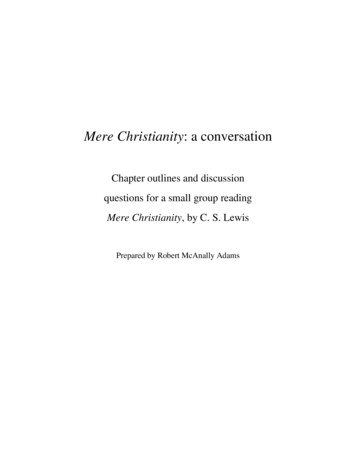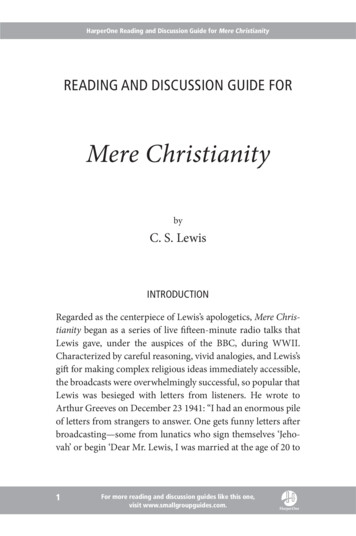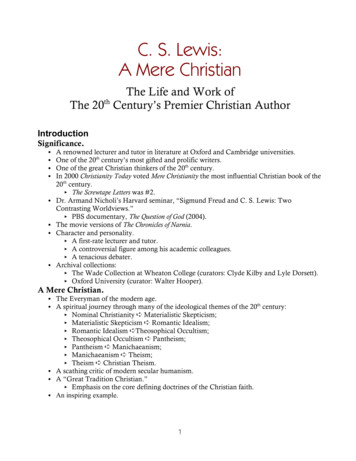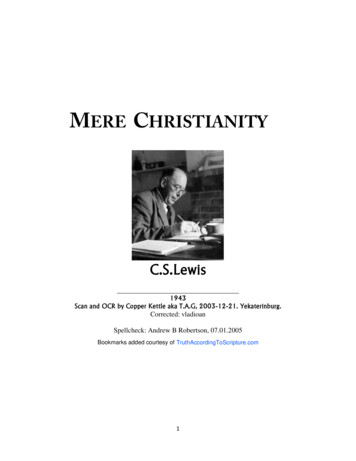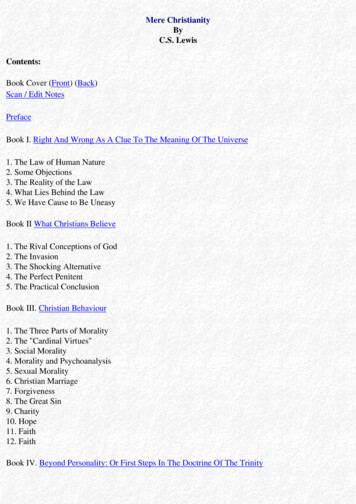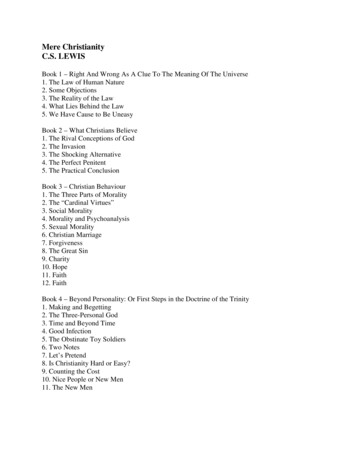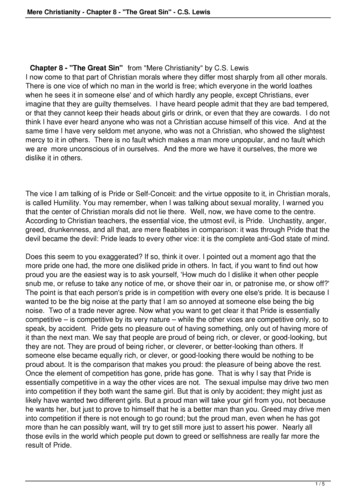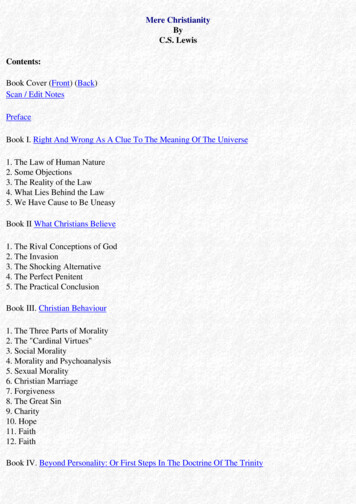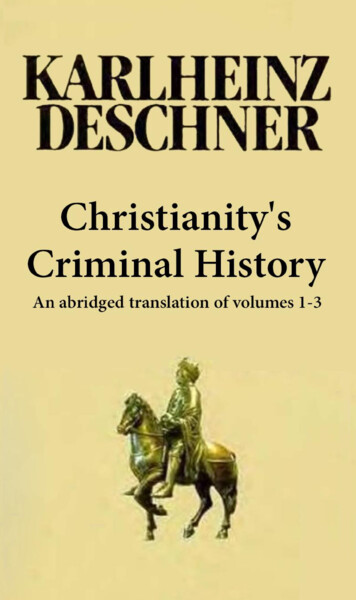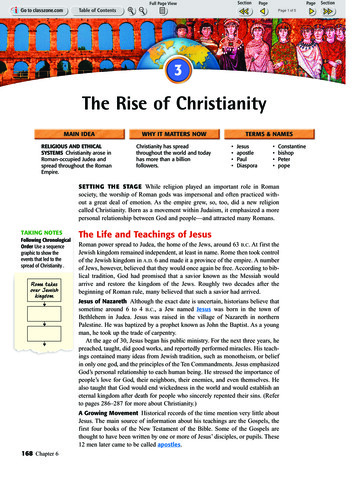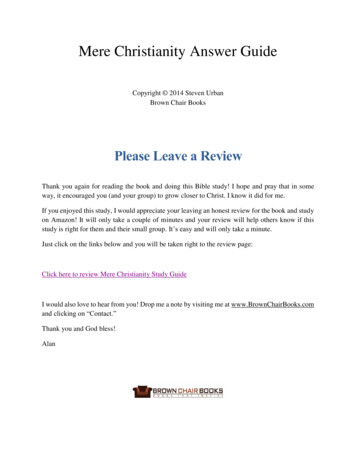
Transcription
Mere Christianity Answer GuideCopyright 2014 Steven UrbanBrown Chair BooksPlease Leave a ReviewThank you again for reading the book and doing this Bible study! I hope and pray that in someway, it encouraged you (and your group) to grow closer to Christ. I know it did for me.If you enjoyed this study, I would appreciate your leaving an honest review for the book and studyon Amazon! It will only take a couple of minutes and your review will help others know if thisstudy is right for them and their small group. It’s easy and will only take a minute.Just click on the links below and you will be taken right to the review page:Click here to review Mere Christianity Study GuideI would also love to hear from you! Drop me a note by visiting me at www.BrownChairBooks.comand clicking on “Contact.”Thank you and God bless!Alan
Other Studies from Brown Chair BooksClick on any of the Bible studies below to learn more or to download sample chapters visit us atwww.BrownChairBooks.com
Read and Study the Most Famous ChristianAllegory of All Time, The Pilgrim’s Progresswww.BrownChairBooks.comReading The Pilgrim’s Progress by John Bunyan can be a bitchallenging even for the best of readers. Not so with this new,easy-to-read version that translates the original archaiclanguage into simple conversational English allowing readersof all ages to easily navigate the most popular Christianallegory of all time.In addition, The Pilgrim’s Progress Study Guide will guideyou through Bunyan’s masterful use of metaphors helpingyou better understand key concepts, supporting Biblepassages, and the relevance to our world today.To learn more and download sample chapters visit www.BrownChairBooks.com.
Answers to QuestionsPrefaceSURGICAL LITURGICALS(Word-based/Orderly)FROZEN CHOSEN(Pre-destined)HURRIED WORRIED(Free-willed)HOLY ROLLIES(Spirit-led/Spontaneous)1.Ideally, one should place an “X” at the very center of the cross. Thereare Scriptures in support of each of the four arrows which certaindenominations tend to over-emphasize to the exclusion of the others.2.Being with like-minded people is a benefit derived fromdenominations. The familiarity and comfort of certain routines and traditionsdecreases chaos and distractions.3.Over-emphasis of certain truths and doctrines to the point ofcompletely excluding all others is the detriment of denominations. It tendsto leave “thinking” to others, such as pastors and teachers, instead ofthinking for ourselves.4.By “mere Christianity” C.S. Lewis means the agreed upon, common oressentials of Christianity, not the peripheral or tangential.5.In the past “gentleman” was used to mean “one with a coat of armsand landed property”, but today it means someone who is honorable andcourteous, and it is often used not as a fact but as praise. The word“Christian” originally meant “a disciple who accepted the Apostle’s teaching.”
Today, it has come to mean someone who is good or, more commonly,someone who is nice.6.Richard Baxter (1615-1691) was a Puritan English clergyman who,during the English Civil War of the 1600’s, sought to minimize thedifferences between and unite Presbyterians and Anglicans and IndependentNon-conformists by focusing on a “mere” Christianity.Book 1: Right and Wrong as a Clue to the Meaning of the UniverseChapter 1: The Law of Human Nature1.They are appealing to some kind of standard of behavior they expectthe other person to know.2.The rule or “law” of right or wrong; in the past, this was called “thelaw of nature” or “the law of human nature.”3.In the laws of nature, an object cannot choose whether to obey thelaw or not. In the law of human nature, a man can choose to either obey ordisobey.4.Because they thought everyone knew it by nature – by who they wereby human nature – and it was odd if someone did not know right fromwrong.5.Some have said that different civilizations and different ages have haddifferent notions of decent behavior right and wrong.6.He does it is two ways:1. Different moralities were never totally different.2. Deniers always go back upon their denials, “throughout historythere have absolutely been no absolutes.”7.None of us really keep the law of human nature. In other words, wefail to practice the kind of behavior we expect of others.8.A summary might include:
1. Humans are haunted by this curious idea of how they ought tobehave.2. Though we know this ought or Law of Human Nature, we, in fact,fail to behave in accordance with it. We do not practice what wepreach.3. These two points then are the foundations for all clear thinkingabout ourselves.Book 1: Right and Wrong as a Clue to the Meaning of the UniverseChapter 2: Some Objections1. First Objection:A. Herd instincts include a mother’s love, sexual instinct and instinctsfor food – they prompt us with impulses or desires.B. The Moral Law is perceived as an “ought”. An instinct is perceivedas a “want,” “desire” or “impulse.” Moral Law is what judges betweentwo instincts and therefore is not itself either of the two.C. An instinct is like one note on a keyboard or a key on a piano.Moral Law is like a sheet of music. An instinct is neither right norwrong in itself, anymore than a key is right or wrong.D. The stronger of the two instincts would win out and be followed.F. No one impulse or instinct is always good. A mother’s love,patriotism, etc. can lead to unfairness and prejudice within families,communities and nations. Following only one impulse of our nature atall cost can be dangerous and make us into devils.2. Second Objection:A. Human conventions we have learned from parents or society includedriving on one side of the road, putting napkins on our laps when weeat, or what we wear to a ballgame, etc.B. Mathematics.C. First, differences between the moral ideas of two different countriesor two different time periods are not THAT great, but the differences in
conventions are. Second, if one set of morals is better than anotherset, one is measuring both by some third standard.D. Witch burning wasn’t an error of moral law, but a error of fact.Witches do not, in fact, exist. But if they did, and they were torturingand killing people with special powers, then they ought to be stopped.Book 1: Right and Wrong as a Clue to the Meaning of the UniverseChapter 3: The Reality of the Law1.The first is that humans are haunted by the notion by some sort ofbehavior they ought to practice, the notion of fair play or decency ormorality or Law of Nature. Second, humans do not practice or live up to thisnotion.2.CSL says he is not concerned at the present with blame, but ratherwith trying to find out the truth and if not conforming with the ought has anyconsequences.3.“Laws of Nature” as applied to stones or trees are really ondescriptions of what stones or trees actually do. Thus, the Laws of Natureare just part of nature. But the Law of Human Nature does not describewhat humans actually do, and therefore is not part of the machine of nature.4.Two different human acts can be equally inconvenient to oneself, whilebeing completely opposite in terms of ‘ought’ or decent behavior. Forexample, getting a seat on a train: one man gets the seat first versusanother man who moves my bag and slips into the seat while my back isturned. Both are inconvenient, but only one involves the ‘ought’.5.One might ask, “Why ought I be unselfish?” The answer is “forsociety.” Then one might ask, “Why should I care about society except if itbenefits me?” The answer is “because you ought to be unselfish.” In logicand debate this is called a “tautology” or simply saying the same thing overwithout ever giving a reason.6.Each are applications of the ought, not acknowledgements of theexistence of the ought as something separate and apart from the machine ofnature, separate and apart from my biological instincts or desires, and apartfrom learned social conventions.
Book 1: Right and Wrong as a Clue to the Meaning of the UniverseChapter 4: What Lies Behind Law?1.The “Materialist View” states that matter and space happen to existand always have existed. Matter behaves in certain fixed, unalterable ways.All of this came about by chance or by some fluke to produce us – creatureswho are able to think!2.The “Religious View” states that something like a “mind” is behind theuniverse, and it is conscious or aware and has purposes and preferences.3.Science can tell us what they learn from external observations of thefacts of nature or from the results of their experiments. They cannot answeranything about ultimate questions or the “why” behind the universe.4.The one thing and only thing is man. We don’t merely observe man,we are men or women. It is the one and only thing we can know more thananything we can ever know from mere external observational knowledge.5.Either the universe is without purpose and reason, or there issomething behind it or outside it. Scientific observations cannot observeanything outside the universe as a fact within the universe any more thanone can observe an architect-as-a-wall within a house. But we can knowother men because we are men. Just as we receive letters from a mailmanwith-little-packets, we know other men receive letters also when themailman goes to their addresses. Likewise we can know that other menhave moral laws that seem to be from outside the universe because we havesuch a moral law.6.The third view is “Life Force Philosophy” or “Creative Evolution” or“Emergent Evolution”. It says some kind of force is behind or outside theuniverse, but if the force is without purpose or presence, then it is merelythe chance of the Material View. But if the force has preferences, then it islike a mind, which is the Religious View, with all its thrills but none of theconsequences. In other words, it is mere wishful thinking.See summary chart below:
ViewDescriptionAdherentsMaterialist ViewReligious ViewLife-Force ViewNothing is behindthe universe.Matter and spacejust happen toexist and alwayshave existed.Matter behaves incertain fixed ways,which by somefluke or chance,happened toproduce us creatures whothink!Something like amind is behind theuniverse; it isconscious and ithas purposes andpreferences.Some kind of Forceis behind theuniverse. But if it iswithout purposesand preferences, itis only chance. Ifit has purposes,then it is like amind. This Viewhas all the thrills ofthe Religious Viewbut none of thecosts; i.e. it ismerely wishfulthinking!DarwinianEvolutionists,Secular Humanists,MarxianMaterialistsMost of the World’sMajor ts,Henry Bergson,George BernardShawBook 1: Right and Wrong as a Clue to the Meaning of the UniverseChapter 5: We Have Cause to be Uneasy1.If a clock is wrong, you can turn it back. Sometimes the only way toprogress forward if you’ve made a wrong turn is to go back.2.Religious jaw (i.e. religious talk):A. We are not getting our knowledge from churches or Bibles, butrather just from our own “steam” (i.e. experience and reason).B. The first bit of evidence is the universe around us, which isartistically beautiful but mercilessly cruel. The second bit is the“ought” within us, which won’t indulge us, but is as hard as nails.
C. If the universe is not governed by absolute goodness, then all ourefforts are, in the long run, hopeless, like playing Russian roulette. Ifthere isn’t absolute goodness behind the Law of Human Nature, then itwon’t bother about or disapprove of human greed, exploitation, etc.D. If the universe is governed by absolute goodness, then we are alsohopeless. We daily make ourselves an enemy of the goodness behindthe “ought” or Law of Human Nature, because if we make one justmistake, we have failed; and it is unlikely that we will ever improve.Absolute goodness, then, is the supreme terror.3.CSL states that he chose this round about manner to get to his realsubject because, without first facing the facts, Christianity makes no sense.Only when you know you are in violation of the Law and the Power behindthe Law does Christianity begin to speak. Only when you know you are sickdo you listen to the doctor. In the long run, Christianity is a thing ofunspeakable joy, but it starts off in dismay.Book 2: What Christians BelieveChapter 1: The Rival Conceptions of God1.Atheists must believe that all religions are wrong all the way through,and consequently, most humans have been wrong all the way throughhistory. Christians don’t have to believe that all religions are wrong all theway through, but they do believe where there is a difference, Christianity isright.2.Non-believers in a God or gods:- Western European MaterialistsBelievers in a God- Christianity- Ancient Greeks- Ancient Romans- Modern Savages3.or gods:- Stoics- Platonists- Hindus- MuslimsPantheism vs. Theism
Views of GodEthical or MoralPerspectiveCosmologicalPerspectiveAdherent Groupsor IndividualsPantheismTheismGod is beyond good and evil.God is good.God is the universe or “all isone.” individual things withinthe universe aremanifestations of God.God is separate and apartfrom the universe, as anauthor is separate andapart from a book.HegelHinduismJudaismIslamChristianity4.The big question is: “If a good God made the world, why has it gonewrong?” Before his own conversion, C.S. Lewis responded by refusing tolisten while thinking, “Aren’t all your arguments simply a complicatedattempt to avoid the obvious?”5.First, he wondered how, in the first place, he had gotten the notion ofjust and unjust, by which to measuring or judge the universe. Then, intrying to prove God did not exist and that the whole of reality wasmeaningless, he had to initially assume that his view of justice was full ofmeaning or sense. But, if the whole universe was really senseless, wewouldn’t have ever been able to discover it.Book 2: What Christians BelieveChapter 2: The Invasion1.The other view is what Lewis calls “Christianity-and-water”, whichposits that there is a good God in heaven but avoids the more complicateddoctrines of sin, hell, salvation, etc.Christianity-and-water is another word for deism, which derives theexistence of God from reason and experience, but rejects revelation,prophecy and miracles. Deism came about during the Enlightenment and
had no historical antecedents common to all other religions. It held that Godwas like a clockmaker who created a clock and then just left it to run downwithout any further interaction. Adherents of deism include ThomasJefferson, John Locke and Mark Twain. CSL considered atheism and deismto be “boys’ philosophies” because they simply do not address crucial issues.2.Real things are not simple (e.g., seeing a table involves atoms, lightwaves, optic nerve and the brain). Therefore, to expect a simple religion issophomoric and naïve.Anti-Christians use “simplicity” to attack Christianity in two ways:1. They put up a version of Christianity suitable for a six-year-old (i.e.a straw man) and make it the object of their attack.2. When confronted with genuine Christian doctrine, they complain it isall too complicated.3.It could not have been guessed or predicted, which means it has allthe elements or unusual twists that reality does.4.The problem is “a universe that contains much that is obviously badand meaningless, but contains creatures like ourselves who know that it isbad and apparently meaningless.”The only two views around that “face all the facts” are Christianity anddualism.5.Dualism is the belief that there are two equal and independent powersbehind everything, one good and one evil, and the universe is a battlegroundwhere they fight an endless war. Neither power made the other. Eachpower thinks it is good or right and the other bad or wrong. Withoutabsolute standards of right and wrong, there is no way to distinguish goodfrom evil, and we are left with only our preferences.6.Both Christianity and dualism believe in good and evil. Dualismbelieves evil is eternally co-existent with good. Christianity believes a goodGod initially created Satan as good, but Satan rebelled and chose to spoilgoodness.
Both believe that universe is at war. Dualism believes the war is anever-ending, eternal struggle. Christianity believes it is a temporary evilwar or rebellion that will come to a conclusion or end.7.We live in a land occupied by a Rebel. The rightful King has landed indisguise in our midst, calling us to join Him and take part in a greatcampaign of sabotage.For a summary review of the battle terrain, see Appendix 3.Book 2: What Christians BelieveChapter 3: The Shocking Alternative1.The answer revolves around free will. Anyone in authority knows howsomething can be both against your will in one way and in accordance withyour will in another. A mother may tell her children “I am not going to cleanup your room every night, you must learn to do it.” When she later finds theroom in a mess, it is against her will. But in as much as she has left it up tothe children, it is in accordance with her will. Similarly, the happiness whichGod designed for His higher creatures is the happiness of being freely andvoluntarily united to Him. God, of course, knew what would happen if theirfreedom was used in a wrong way, but He thought it was worth the risk.2.God did not make any creature out of “rotten stuff” so that it wouldgo wrong. The better stuff a creature is made of – the cleverer and strongerand freer it is – the better it will be if it goes right, but also the worse it willbe if it goes wrong. A cow cannot be very good or very bad; a dog can beboth better and worse; a child better and worse still; an ordinary man, stillmore so; a genius, still more so; a superhuman spirit best – or worst – ofall.3.A reasonable (and traditional) guess about Satan is that he chose toput himself first before God – wanting to be the center, wanting to be God –and taught the human race to do the same. Wanting to “be like gods” is,according to CSL, “the key to history.” Seeking happiness outside and apartfrom God or “trying to run the human machine on the wrong juice,” humanshopelessly sought to be satisfied with other things. The result of Satan’s plothas been poverty, war, prostitution, classes, empires, slavery, etc.
4.God employed three things to prepare humanity for His solution toSatan’s plot:1. He left all mankind with a conscience or ‘ought’ or Law of HumanNature. (See Appendix 2 again)2. He gave good dreams or visions to people all around the world.(See Appendix 4)3. He selected one group of people and spent several centurieshammering into their heads the kind of God He was and the kind ofconduct He cared about: the Jews. (See Appendix 4)5.Then God brought forth his shocking alternative solution. From theJews there came a man who claimed to be God (remember a Jew is not aPantheist who believes everything is a manifestation of God). He claimed tobe able to forgive any and all sins (this is something only God can do). Hespoke of himself as humble and meek (which was a meaningless statementfor a man who did the things He did, but not one for God incognito).6.Based then on what Jesus said, one is not left with the option of callingHim a good moral teacher. He either is a Liar, a Lunatic, or the Lord!Book 2: What Christians BelieveChapter 4: The Perfect Penitent1.God has landed in this enemy-occupied world to teach us. The NewTestament is chock full of the topic: His death and His coming to life again.2.The central Christian belief is that Christ’s death has somehow put usright with God (fulfilled the “ought”) and given us a fresh start. Theories asto how His death did this are another matter and are not really Christianity –they are only attempted explanations. Christians believe that the death ofChrist is the point in history at which something absolutely unimaginablefrom outside the universe showed though into our own world, and that bydying, Christ disabled death itself. That is Christianity!
3.CSL thinks that “being let off” or “footing the bill” are too simple andincomplete for explanations of what Christ’s death has done for fallen man.Fallen man is not merely an imperfect man needing improvement; he is arebel needing to surrender and lay down his arms.4.The process of surrender or repentance is a “kind of death” or “killingpart of yourself.” CSL notes this presents a dilemma as “only a bad personneeds to repent: only a good person can repent perfectly.” The worse aperson is, the more he needs to repent and the less he is able to do so. Butthe Perfect Penitent, or the Perfectly Repentant Person, is also part of God’ssolution.5.By God becoming man, our human nature, which can suffer and die,was amalgamated with God’s nature in one person. That one Person couldthen help us by surrendering His will to suffer and die because He was man;and He could do it perfectly because He was God.6.One who complains that Christ’s suffering and death were perhapseasier because He was both God and man is akin to someone drowning whocomplains it is unfair that the lifeguard has one foot on the shore.Book 2: What Christians BelieveChapter 5: The Practical Conclusion1.Christ’s sacrifice brought about for man not merely the ability to followHis teachings, but to become the “next step” (from the evolutionist view) ora new kind of man possessed by a new kind of life. (To better understandCSL’s thoughts on evolution, see Appendix 5)2.My thoughts: Just as God made the spread of our physical life arather odd process (i.e. procreation), He also made the spread of our newspiritual Christ-life a rather odd process (i.e. through baptism, belief, and‘bread and wine’). These are the three things “that spread the Christ-life tous.” This means that the new life has spread from the Uncreated-Eternal tothe created-temporal, that we have been ‘impregnated’ so to speak and thatthe Christ-life is growing in us or infusing us.
CSL confesses that he does not understand why three things should be“conductors” of the new life, but he goes on to answers some of the mostfrequent objections to this aspect of Christianity.The role of belief, baptism and bread and wine as conductors of theChrist-life are to be believed based on Christ’s authority. CSL notes that, “Aman who jibbed at authority in other things as some people do in religionwould have to be content to know nothing all his life.” This is because weknow and take a lot of things of things to be true based on the authority ofothers. (For example, have you ever actually seen electrons flowing along awire when you turn on a light switch?)3.CSL notes that belief, baptism and bread and wine are not substitutesfor our own efforts to copy Christ in being good. Nevertheless, the Christiandiffers from other people who are trying to be good, inasmuch as he “doesnot think God will love us because we are good, but that God will make usgood because He loves us.”The Christian does not believe that the Christ-life in him is merelysomething mental or moral. He knows that Christ is actually working throughthe cells and muscles and fingers of his physical body. He does not shun‘bodily acts’ such as baptism and the Lord’s Supper thinking they are crudeor unspiritual because God did not shun them. “God . . . invented eating. Helikes matter. He invented it.”4.It is unfair to think that the Christ-life is confined only to those whohave heard of Christ. “We do know that no man can be saved exceptthrough Christ” but we do not know how God is working where the Gospelhas yet to be fully proclaimed (again see Appendix 4).5.According to CSL, the reason for God’s continued secrecy rather thanan overt, outright invasion is that He wants to give all mankind a chance tochoose to be on His side. “God is going to invade, all right: but what is thegood of saying you are on His side then, when you see the whole naturaluniverse melting away . . . Now, today, this is our chance to choose the rightside. God is holding back to give us that chance. It will not last forever.”
Book 3: Christian BehaviorChapter 1: The Three Parts of Morality1.There are two ways in which human machines goes wrong:One way is when human individuals go in different directions and driftapart or conversely collide with one another (like a fleet of ships going off indifferent directions or running into each other or like different instruments ina band playing at the wrong time).A second way is when something goes wrong inside the individual (likesomething going wrong within a ship that makes it un-seaworthy or like aband instrument being out of tune).2.The third way in which human machines go wrong is in their purposeor the overriding reason for what they do (where the fleet is trying to go orwhat song the band is trying to play).3.Morality therefore appears to be concerned with three things:1.Fair play between individuals;2.Tidying up or harmonizing things within each individual;3.The general purpose of the individuals as a whole.4.Most modern people usually acknowledge and do not disagree toomuch about fair play between individuals (or social morality).5.The second part is also important because we are deceived if we donot recognize the impact that things amiss within an individual, such asgreed, cowardice, conceit, or bad-temper, are psychological dysfunctionsthat will have on society as a whole.6.CSL notes the third part is just as important because this is where“different beliefs about the universe lead to different behaviour”. If onebelieves himself to be the landlord of his own ship (mind and body) he willnot avail himself to God’s purposes. On the other hand, recall thatChristianity asserts every human individual is going to live forever. If this istrue, even if a state or nation lasts a thousand years, the individual is stillnot only more important but incomparably more important. The significanceis this: whereas my bad temper may not be much to bother about if I am
going to only live seventy years, in a million years it could gradually becomean absolute hell.7.If we are to think about morality, we must think about all three parts:relations between man and man, things within a man, and the relationbetween man and the power that made him. If you think deeply enoughabout this, you will realize we are talking about love, faith and hope.Book 3: Christian BehaviorChapter 2: The ‘Cardinal Virtues’1.Prudence means practical common sense or taking the trouble tothink out what you are doing and what the consequences will be. ManyChristians today have the idea that “provided you are ‘good’ it does notmatter being a fool.” They have twisted Christ’s saying about getting into Hiskingdom by being like children – which Paul flatly refutes. While we are to be“as gentle as doves”, we are also to be “as wise as serpents”. As CSL states,“He wants a child’s heart, but a grown-up’s head”.2.Temperance is unfortunately one of those words that have changedits meaning. It is equated today with “teetotalism” but originally it was not areference specifically to alcohol but to all pleasures. Additionally, it did notmean abstaining, but going the right distance and no further. There arecertain times when abstinence may be appropriate, but CSL notes that onemark of a certain type of bad man is that he cannot give up a thing himselfwithout wanting everyone else to give it up.3.Justice means more than what goes on in a court of law. It is the oldword for everything we mean by “fairness” including honesty, truthfulness,keeping promises, etc.4.Fortitude includes two kinds of courage: the kind that faces dangerand the kind that endures pain. [Note: courage is not absence of fear, butperseverance in its presence.]5.The three reasons CSL cites as to why it is important to distinguishbetween a person doing some virtuous act and a person who is virtuous are:
1. Right actions done for wrong reasons do not build the internalquality or character called virtue.2. God does not want simple obedience to a set of rules; He wants aspecific sort of person.3. Virtues have value beyond this life – they prepare us for the deep,strong, unshakable kind of happiness God intends for us.6.More common Biblical names for the ‘cardinal virtues’ are:Prudence wisdomTemperance self-control (i.e. “Act as free men, and do not useyour freedom as a covering for evil, but use it as bondslaves ofGod.” 1 Peter 2:16)Justice righteousnessFortitude perseveranceBook 3: Christian BehaviorChapter 3: Social Morality1.The first thing to get clear about Christian morality is that Christ didnot come to preach a new morality. Really great moral teachers neverintroduce new moralities – people are more often in need of reminding, notinstructing in what everyone has always known to be right.2.The second thing to get clear is that Christianity does not have adetailed political program laid out: “It is meant for all men at all times andthe particular programme which suited one place or time would not suitanother.”CSL notes that we are not given a specific political agenda for socialmorality, any more than we are given lessons in cookery to feed the poor ora Greek-Hebrew lexicon with which to read Scripture.
3.The right way the Church should give us a lead in social moralityinvolves the whole body of practicing Christians – the use of specific talentsby those who have them. The wrong way is for the clergy to initiate somekind of political movement.4.CSL says the New Testament hints at – without going into details –what a fully Christian society might be like. It would be more like what wenow call “leftist” with ‘no parasites’ (those who don’t work but who expect toeat), ‘no silly luxuries’ and ‘no sillier advertisements to persuade us to buythem;’ it would be “obedient” to proper government authorities, husbands(ouch!) and parents; it would also be “cheerful” and full of rejoicing withworry and anxiety regarded as wrong. Am I willing to give up all my hardearned luxuries, to be one hundred percent obedient to all human authorityand to parade around in phony cheerfulness when
Non-conformists by focusing on a “mere” Christianity. Book 1: Right and Wrong as a Clue to the Meaning of the Universe Chapter 1: The Law of Human Nature 1. They are appealing to some kind of standard of behavior they expect the other person to know. 2. The rule or “
